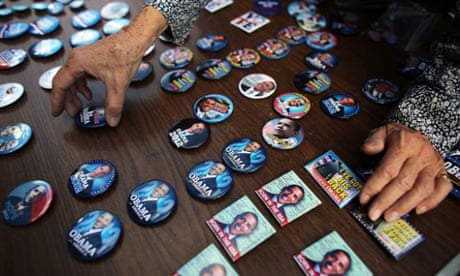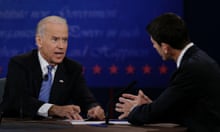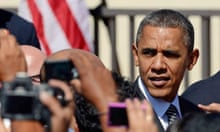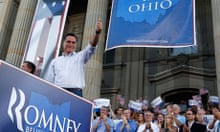The race for president is at its most confusing point of the campaign. The post-debate polling picture has indicated that Mitt Romney has made up ground nationally, but polls from the swing states offer a more complicated and still optimistic picture for President Obama.
Six state-wide polls published by CBS News/New York Times/Quinnipiac and NBC News/Wall Street Journal/Marist illustrate the point well.
The big result is in Ohio where Marist finds that Romney gained 2 points in the last week, but still trails by 6. This matches a CNN/ORC poll from earlier this week that had Obama up 4. It runs slightly behind the average of non-partisan, non-internet polls that give Obama a 1.7-point lead since the debate. It's unlikely Romney can win the White House without Ohio, so these data are bad news for him.
Obama still holds a 1-point lead in Florida – the same as a week ago – according to Marist. Based on all the polls since the debate, the state is likely tied. Romney should be ahead in Florida, if he hopes to win the electoral college.
Romney has flipped a 1-point deficit into a 1-point lead in Colorado according to Quinnipiac. The race there is too close to call taking into other polls as well.
Romney picked up 3 points in Wisconsin, but Quinnipiac still sees him behind by 3. The multitude of data in the Badger State gives Obama a 2- to 3-point advantage.
Virginia is where the pollsters split in their horse race results. Quinnipiac has Obama ahead by 5 percentage points, an improvement of 1 point from a few weeks ago. Marist has Romney gaining the lead in Virginia by reversing a 2-point deficit last week into a 1-point lead. The average of post-convention polls, which puts Obama ahead by a mere 0.6 of a point, suggests Marist is probably a little closer to the truth.
The split between Marist and Quinnipiac in Virginia isn't too unusual. The more important point to take away from Virginia, and indeed all these data, is that none of the results represents a major shift towards Romney since the debate. This matches other state-wide data released from other firms.
One estimate put the average gain for Romney pre- as opposed to post-debate at only 2.4 points in state polls. That generally matches Marist's average gain of 1.7 points and Quinnipiac's of a single point.
Indeed, It might not come as much of a surprise that any debate bounce is smaller in the battleground states. These states have been pummeled by advertising for months. Voters have a pretty firm idea where they stand on the candidates. Still, the difference between the statewide and national polls has been pretty staggering.
Romney has only trailed in one national poll since the debate and has made up somewhere between 5 and 6 points nationwide. The national polls say that Romney is ahead or at least tied in this race. This includes a Fox News poll released on Wednesday evening, with Romney erasing a 5-point Obama lead and going up by 1 point.
History tells us that there is rarely more than a 1-point deviation in the margin between the popular vote and the state that would cause the electoral college winner to change. Considering most everyone pegs Ohio as the state most likely to determine the winner of the electoral college, the gap between the national and Ohio polls would indicate an historically larger than normal split between the electoral and popular vote.
I'd normally take the national data and run with it. Indeed, it would be easier to dismiss the state data if it were conducted by less reputable firms. The issue here is Marist and Quinnipiac do virtually everything right, according to polling standards. Something doesn't square here, and I'm not sure what is causing it.
One factor that is going to get a lot air time is Marist's Ohio party identification. My belief is that party identification can be different between pollsters, but should not be greatly different when examining one pollster's party identification make-up over a short period of time. Marist is reporting that Democrats turned a 5-point identification advantage last week into an 11-point lead in this week. How could that happen?
Marist claims that because Obama earns 63% of support from early voters, who make up 18% of the sample, Democratic self-reported identification went up. Put another way, Democrats already voted and so they made it through the likely voter screen as a larger percentage than they did a week ago. There's nothing necessarily wrong with it, though the jump does strike me as peculiar – given that you'd expect more people to identify as Republicans after Romney's strong debate performance.
Two points, however, suggest that the party identification of the Marist survey is not that significant. One is the political ideology identification make-up of the poll: the percentage of conservatives rose this week as against last by 2 points, while the percentage of liberals fell by 2 points. As Sean Trende has pointed out, this is often a better measure as people are more stable in how they describe their ideology to pollsters than they are of their party identification. Second, Marist's Ohio numbers match the CNN/ORC survey, which had no party identification issues.
Truthfully, the cause of the national and state-wide divergence can't be pegged to one factor. We had this national/state poll difference earlier in the campaign and eventually, it evened itself out. My belief is that it will again, though it may not. For now, confusion will reign to some extent.







